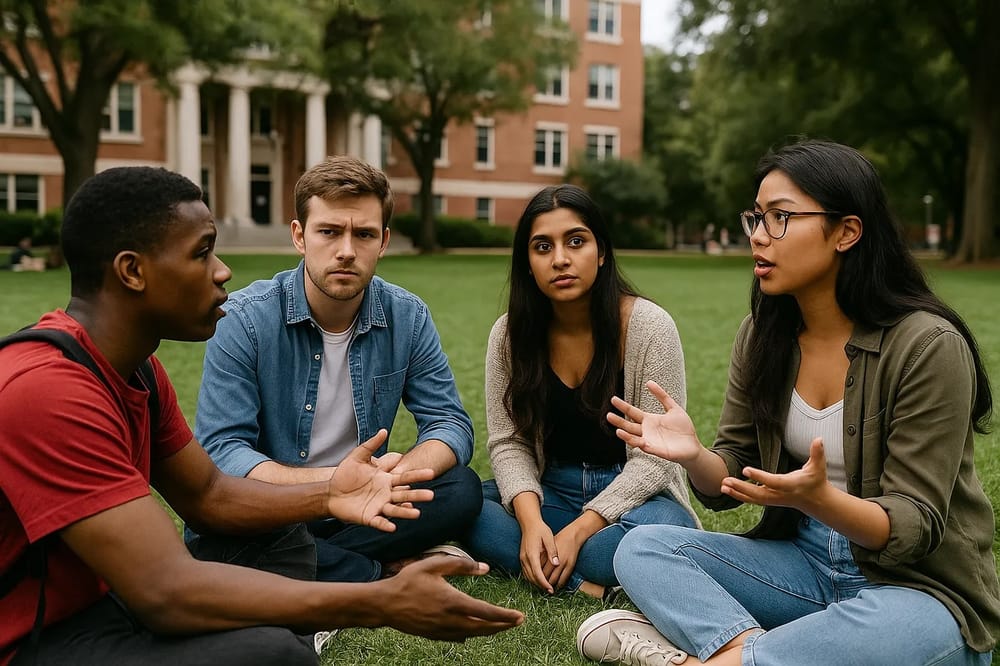Charlie Kirk’s death has reignited a long-simmering and highly charged debate in America.
On one side are people labeling figures like Kirk racists. On the other side are those who recoil in fury at the accusation. “How dare you call me racist just because I don’t agree with you.”
The conversation quickly devolves into a shouting match.
Unless you’re a hood-wearing member of the KKK or proudly marching in Charlottesville, being called a racist isn’t something anyone takes as a compliment. Most people, no matter their political bent, don’t hear the word “racist” and smile.
And yet herein lies the problem.
There’s a wide chasm between what different groups mean by racism. So, when one person says, “You’re a racist,” they’re invoking one definition, while the accused hears another entirely. The result is that we keep talking past each other. Over, around, and under one another, without ever stopping to ask why someone might apply the label and why another person finds it absurd.
For some, racism is only about explicit, conscious prejudice. A person who dislikes others purely because of skin color. In this view, racists are fringe figures. The outliers who mutter “I don’t like Black people,” who fire or assault someone because they’re Black, who wave KKK flags or join the Aryan Nation.
To this camp, opposing affirmative action or criticizing DEI programs isn’t racist. It’s simply policy disagreement.
But for others, racism goes far deeper.
Most Black Americans and many others rarely waste time fretting over the occasional hooded Klansman.
Those bigots are out in the open and easy to spot.
The harder conversation is about how ideas and structures perpetuate racism even without racial slurs. Racism isn’t just the “N-word test.” It’s about assumptions, stereotypes, coded language, and systems that produce unequal outcomes.
Take Charlie Kirk’s own statements.
He once said Michelle Obama and Supreme Court Justice Ketanji Brown Jackson “do not have the brain processing power to be taken seriously.” He went further, claiming they had taken a white person’s slot.
Kirk’s defenders say he was merely responding to people who said affirmative action helped them. But let’s unpack that.
Justice Jackson graduated magna cum laude from Harvard-Radcliffe College, earned her law degree cum laude from Harvard Law, clerked for judges at every level, including the U.S. Supreme Court, and achieved all this before the age of 53.
The deeper issue is that Kirk’s statement presumes the job belonged to a white person, and that whiteness is the default measure of merit. That is, to its core, a racist assumption.
Kirk later insisted he respects all races. But words matter. His quip, “If I see a Black pilot, I’m gonna be like boy, I hope he is qualified,” may have been explained away as an attack on DEI, but the impact is plain. It suggests that a Black professional’s qualifications are automatically suspect.
There’s no evidence, by the way, that even after diversity efforts Black or female pilots train less, pass different tests, or crash more planes than anyone else. The idea that seeing a Black pilot should trigger doubt is itself the problem.
A person can articulate a policy disagreement without engaging these sorts of racially charged one-liners.
This really is bigger than Charlie.
History shows how racism works even when no one says “I hate Black people.”
Ronald Reagan’s “welfare queens” speech painted Black women as schemers defrauding taxpayers. The trope stuck, even though widespread welfare fraud by Black women never existed. The result? Deep cuts to social programs disproportionately hurting Black families.
Richard Nixon’s “Southern Strategy” never promised to protect white supremacy outright. Instead, he spoke of “law and order” and “states’ rights.” Language that appealed to white voters resisting civil rights and ushered in mass incarceration that devastated Black communities.
Modern voter ID laws are sold as “election integrity.” But study after study shows they disproportionately suppress Black and brown voters — through fewer polling stations, longer lines, stricter ID requirements that many poor people can’t comply with.
Housing fights over “neighborhood character” or “low-income housing” sound neutral. In practice, they’ve reinforced segregation, blocked Black families from buying into better neighborhoods, and widened the racial wealth gap.
No racial epithets are needed. The result of entire communities locked out of opportunity is just as corrosive as an open bigot’s rant. Likely more so.
Still, if we want intelligent dialogue about racism, we must first recognize these competing definitions.
For some, racism only means burning crosses. For others, it’s also the subtler assumptions, policies, and cultural codes that tilt the playing field. Both sides are speaking different languages.
We shouldn’t ever whitewash the depth of racism in this country. But if we’re to fix anything, our method must be conversation. Messy, heated, honest conversation.
I didn’t like Charlie Kirk. Even some conservative commentators before his murder said he was too extreme.
Many of Charlie’s ideas were, in my view, bankrupt and promoted racism.
But I appreciated that he was at least willing to engage publicly. Sometimes he scored points. Other times students and critics dismantled and even eviscerated his arguments.
That’s the way it should be. Confront bad ideas, test them, defeat them. Not by silence, but by dialogue.
As we have these debates, we’d do well to remember the words of Preacher Theodore Parker, later echoed by Martin Luther King Jr.:
“I do not pretend to understand the moral universe, the arc is a long one, my eye reaches but little ways. I cannot calculate the curve and complete the figure by the experience of sight; I can divine it by conscience. But from what I see I am sure it bends towards justice.”
The arc only bends if we keep pushing it.
By naming racism honestly, refusing to minimize its impact, and still leaving room for real debate and conversation.
This post originally appeared on Medium and is edited and republished with author's permission. Read more of Jeffrey Kass' work on Medium.
